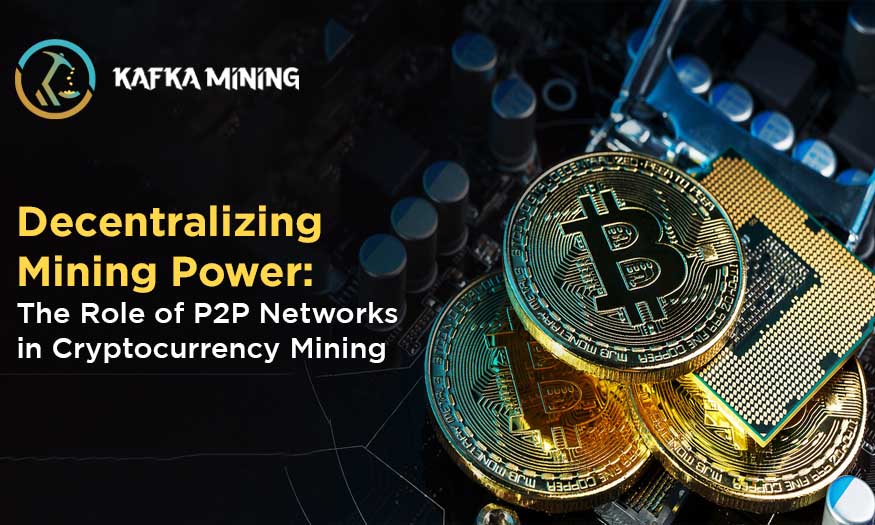
As a cryptocurrency enthusiast, I have always been fascinated by the concept of mining. Cryptocurrency mining is the process by which new coins are created and transactions are verified. It is a crucial aspect of the cryptocurrency ecosystem, as it helps to maintain the integrity and security of the network. However, over the years, the mining process has become increasingly centralized, with a small number of large mining pools controlling the majority of the network's computing power. In this article, I will explore the importance of decentralizing mining power and the role that peer-to-peer (P2P) networks can play in achieving this goal.
Introduction to Cryptocurrency Mining
Before we delve into the topic of decentralizing mining power, let's first take a brief look at what cryptocurrency mining entails. In simple terms, cryptocurrency mining involves using specialized hardware to solve complex mathematical problems. These solutions are then added to the blockchain, which is a decentralized ledger that records all transactions on the network. Miners are rewarded with new coins for their contributions to the network, and the process continues.
The Centralization of Mining Power
One of the biggest challenges facing the cryptocurrency mining industry today is the centralization of mining power. As mentioned earlier, a small number of large mining pools control the majority of the network's computing power. This is a problem because it creates a situation where a single entity can potentially control the network and manipulate it for their own gain. This is a significant threat to the security and integrity of the network, as it undermines the decentralized nature of cryptocurrencies.
The Importance of Decentralizing Mining
Decentralizing mining power is crucial for maintaining the integrity and security of the cryptocurrency network. By distributing mining power across a large number of individual miners, the network becomes more resilient to attacks and manipulation. Additionally, decentralization helps to ensure that no single entity has too much control over the network, which is important for maintaining the trust and confidence of users.
P2P Networks and Cryptocurrency Mining
Peer-to-peer (P2P) networks are a type of decentralized network that can be used to distribute mining power across a large number of individual miners. P2P networks allow miners to connect directly with each other, rather than going through a centralized intermediary. This helps to distribute mining power more evenly across the network, making it more resilient to attacks and manipulation.
Advantages of P2P Networks in Cryptocurrency Mining
P2P networks offer several advantages over traditional centralized mining pools. First and foremost, P2P networks are more resilient to attacks and manipulation, as they are not controlled by a single entity. Additionally, P2P networks are more flexible and adaptable than centralized mining pools, as they can easily scale up or down depending on the needs of the network. Finally, P2P networks are more secure than centralized mining pools, as they do not store large amounts of cryptocurrency in a single location.
Challenges in Implementing P2P Networks for Cryptocurrency Mining
Despite the many advantages of P2P networks for cryptocurrency mining, there are also several challenges that must be addressed. One of the biggest challenges is the need for a robust and reliable network infrastructure. P2P networks rely on individual miners to connect with each other, which can be challenging in areas with poor internet connectivity or unreliable power grids. Additionally, P2P networks require a certain level of technical expertise to operate, which can be a barrier to entry for some users.
Real-Life Examples of P2P Networks in Cryptocurrency Mining
There are several real-life examples of P2P networks being used in cryptocurrency mining. One such example is the Grin network, which uses a P2P network to distribute mining power across a large number of individual miners. Another example is the Bitcoin network, which uses a P2P network to distribute mining power among individual miners who connect to the network.
Future of Decentralized Cryptocurrency Mining
The future of decentralized cryptocurrency mining looks bright, as more and more miners begin to adopt P2P networks and other decentralized technologies. As P2P networks become more robust and reliable, we can expect to see a continued shift away from centralized mining pools towards more decentralized models. Additionally, as more users become familiar with the technical aspects of cryptocurrency mining, we can expect to see a broader range of individuals participating in the network.
Conclusion
Decentralizing mining power is crucial for maintaining the integrity and security of the cryptocurrency network. P2P networks offer an effective solution for achieving this goal, as they distribute mining power more evenly across the network and make it more resilient to attacks and manipulation. While there are certainly challenges to implementing P2P networks for cryptocurrency mining, the benefits are clear. As the cryptocurrency ecosystem continues to evolve, we can expect to see a growing focus on decentralization and the use of P2P networks to support it.
As a cryptocurrency enthusiast and supporter of decentralization, I strongly believe in the importance of decentralizing mining power. By using P2P networks and other decentralized technologies, we can help to ensure that the cryptocurrency network remains secure, resilient, and trustworthy. I encourage all miners and cryptocurrency users to explore the use of P2P networks and other decentralized technologies in their mining efforts, and to join the movement towards a more decentralized future for cryptocurrency.
Leave a Comment